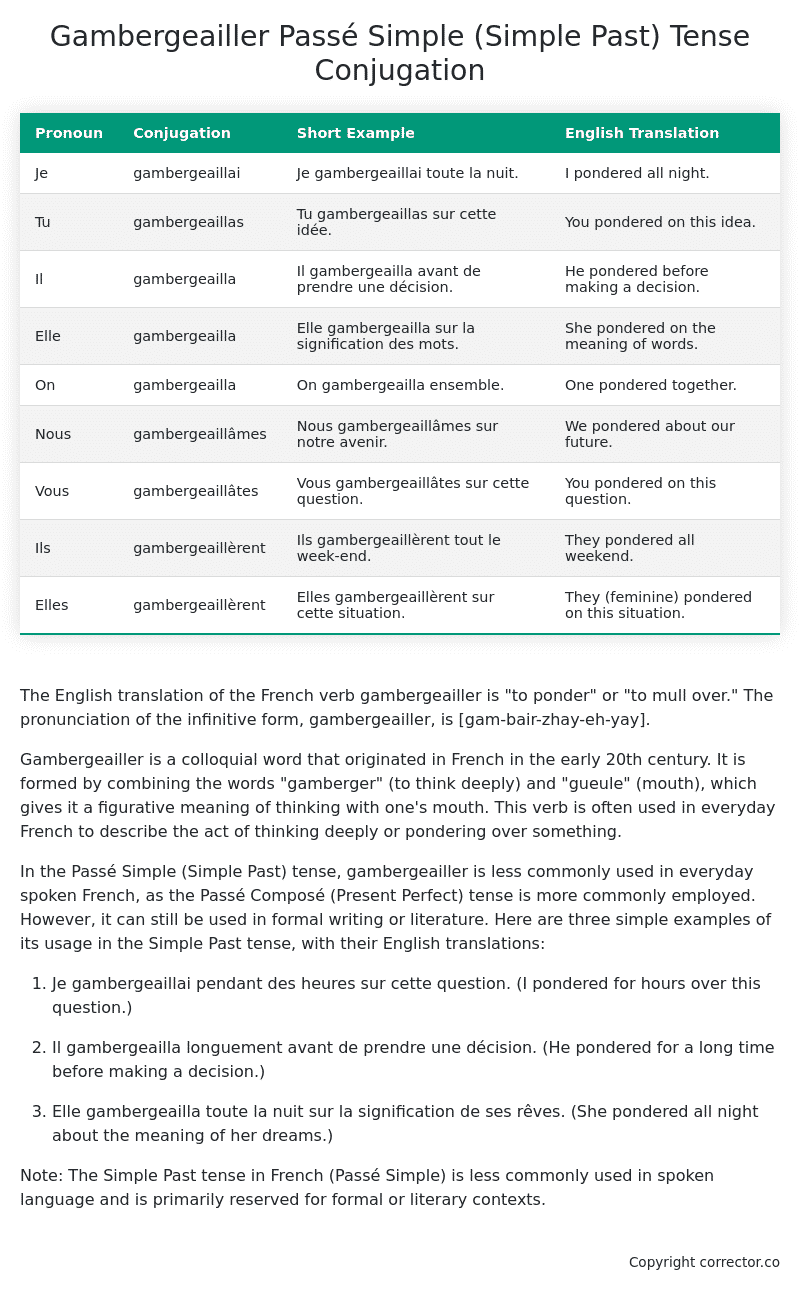Passé Simple (Simple Past) Tense Conjugation of the French Verb gambergeailler
Introduction to the verb gambergeailler
The English translation of the French verb gambergeailler is “to ponder” or “to mull over.” The pronunciation of the infinitive form, gambergeailler, is [gam-bair-zhay-eh-yay].
Gambergeailler is a colloquial word that originated in French in the early 20th century. It is formed by combining the words “gamberger” (to think deeply) and “gueule” (mouth), which gives it a figurative meaning of thinking with one’s mouth. This verb is often used in everyday French to describe the act of thinking deeply or pondering over something.
In the Passé Simple (Simple Past) tense, gambergeailler is less commonly used in everyday spoken French, as the Passé Composé (Present Perfect) tense is more commonly employed. However, it can still be used in formal writing or literature. Here are three simple examples of its usage in the Simple Past tense, with their English translations:
-
Je gambergeaillai pendant des heures sur cette question.
(I pondered for hours over this question.) -
Il gambergeailla longuement avant de prendre une décision.
(He pondered for a long time before making a decision.) -
Elle gambergeailla toute la nuit sur la signification de ses rêves.
(She pondered all night about the meaning of her dreams.)
Note: The Simple Past tense in French (Passé Simple) is less commonly used in spoken language and is primarily reserved for formal or literary contexts.
Table of the Passé Simple (Simple Past) Tense Conjugation of gambergeailler
| Pronoun | Conjugation | Short Example | English Translation |
|---|---|---|---|
| Je | gambergeaillai | Je gambergeaillai toute la nuit. | I pondered all night. |
| Tu | gambergeaillas | Tu gambergeaillas sur cette idée. | You pondered on this idea. |
| Il | gambergeailla | Il gambergeailla avant de prendre une décision. | He pondered before making a decision. |
| Elle | gambergeailla | Elle gambergeailla sur la signification des mots. | She pondered on the meaning of words. |
| On | gambergeailla | On gambergeailla ensemble. | One pondered together. |
| Nous | gambergeaillâmes | Nous gambergeaillâmes sur notre avenir. | We pondered about our future. |
| Vous | gambergeaillâtes | Vous gambergeaillâtes sur cette question. | You pondered on this question. |
| Ils | gambergeaillèrent | Ils gambergeaillèrent tout le week-end. | They pondered all weekend. |
| Elles | gambergeaillèrent | Elles gambergeaillèrent sur cette situation. | They (feminine) pondered on this situation. |
Other Conjugations for Gambergeailler.
Le Present (Present Tense) Conjugation of the French Verb gambergeailler
Imparfait (Imperfect) Tense Conjugation of the French Verb gambergeailler
Passé Simple (Simple Past) Tense Conjugation of the French Verb gambergeailler (You’re reading it right now!)
Passé Composé (Present Perfect) Tense Conjugation of the French Verb gambergeailler
Futur Simple (Simple Future) Tense Conjugation of the French Verb gambergeailler
Futur Proche (Near Future) Tense Conjugation of the French Verb gambergeailler
Plus-que-parfait (Pluperfect) Tense Conjugation of the French Verb gambergeailler
Passé Antérieur (Past Anterior) Tense Conjugation of the French Verb gambergeailler
Futur Antérieur (Future Anterior) Tense Conjugation of the French Verb gambergeailler
Subjonctif Présent (Subjunctive Present) Tense Conjugation of the French Verb gambergeailler
Subjonctif Passé (Subjunctive Past) Tense Conjugation of the French Verb gambergeailler
Subjonctif Imparfait (Subjunctive Imperfect) Tense Conjugation of the French Verb gambergeailler
Conditionnel Présent (Conditional Present) Tense Conjugation of the French Verb gambergeailler
Conditionnel Passé (Conditional Past) Tense Conjugation of the French Verb gambergeailler
Conditionnel Passé II (Conditional Past II) Tense Conjugation of the French Verb gambergeailler
L’impératif Présent (Imperative Present) Tense Conjugation of the French Verb gambergeailler
L’impératif Passé (Imperative Past) Tense Conjugation of the French Verb gambergeailler
L’infinitif Présent (Infinitive Present) Tense Conjugation of the French Verb gambergeailler
L’infinitif Passé (Infinitive Past) Tense Conjugation of the French Verb gambergeailler
Le Participe Présent (Present Participle) Tense Conjugation of the French Verb gambergeailler
Le Participe Passé (Past Participle) Tense Conjugation of the French Verb gambergeailler
Struggling with French verbs or the language in general? Why not use our free French Grammar Checker – no registration required!
Get a FREE Download Study Sheet of this Conjugation 🔥
Simply right click the image below, click “save image” and get your free reference for the gambergeailler Passé Simple tense conjugation!

Gambergeailler – About the French Passé Simple (Simple Past) Tense
Formation
Usage
Narration
Historical Context
Interactions with other tenses
Passé Composé
Imparfait
Conditional and Subjunctive
Summary
I hope you enjoyed this article on the verb gambergeailler. Still in a learning mood? Check out another TOTALLY random French verb conjugation!


